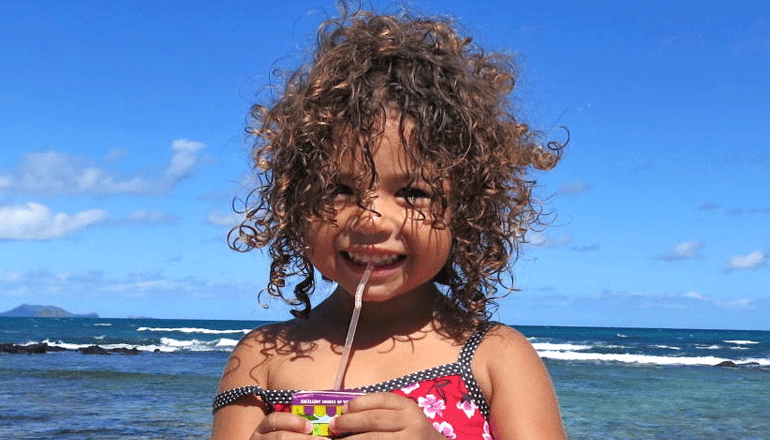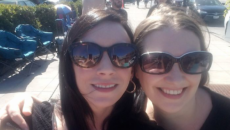I don’t think I could ever do that,” said my friend over lunch. He shook his head, smiled in disbelief.
My family is visiting my daughter’s birth family this summer. It will be our first time meeting her birth father, Jesse. And it will be the first time we’ve seen April, her birth mother, in nearly two years. We expect we’ll also be meeting Jesse’s and April’s parents, and probably all of April’s kids, if not just the two who are full biological siblings to our daughter, Louisa.
Until you have adopted, you cannot understand the enormous sense of security that you possess, the intensely grounded feeling of being a family. You fought for it, perhaps cried for it, possibly spent yourselves into debt for it. Earned it. I have no insecurity or fear about this trip because the three of us—my husband, Peter, our daughter, Louisa, and myself—couldn’t be any closer or more bonded, any more of a family. I am surer of nothing in the world.
Meeting Louisa
The last time we laid eyes on April she was getting into a car headed to the Los Angeles airport, farther from home than she’d ever been and maybe ever will be again. It took three attempts to get her on the outbound flight from Oklahoma City. Nine months pregnant, 28 years old, mother of five, as broke as broke can be, she had never flown before and was so petrified that she deplaned two other flights on two other days before going through with it.
Our attorneys had arranged for April to fly to L.A. well before her scheduled C-section, and for Peter and I to fly from Honolulu to join her a few days prior. But then, a week early, April texted me in the middle of the night. Her water had broken and she was on her way to the hospital. The first flight I could get on was at 7 a.m. Louisa was born as my plane neared the halfway mark.
Mimi, a birth mother companion, met me at the double doors to the maternity ward. She had been with Peter and I through our last adoption attempt, one that went horribly awry and left us hollowed out completely, ready to give up. This, now, would be our last attempt. Peter and I hugged, and entered the room.
April smiled woozily, all tubes, tape, and bed-head. I hugged her. The bassinet was in the corner, and I didn’t know if I should approach it. What was the etiquette? How would April interpret my behavior? I don’t remember if someone told me to walk over to it and look at her, which I did, or to pick her up and hold her, which I also did. Mere inches of a rosy, sleeping face peeked out from hospital-issue blankets and a beanie that had been fashioned into a huge bow by a crafty maternity nurse.
“Let Her Say Goodbye”
On a Saturday, the day before Louisa and April would be released from the hospital, Peter and I left the hospital to move our bags and groceries into the apartment we had rented in nearby West Hollywood. We assembled the bassinet and set out diapers and wipes. Microscopic onesies that are now keepsakes in our closet. A bottle brush. Baby soap. We had done it all before, and we knew it meant nothing. April couldn’t legally sign away her parental rights for another week. Although we’d begun to bond with Louisa, she wasn’t our baby yet.
When we returned a few hours later, we looked for Louisa in the nursery. April hadn’t wanted to be alone with her too much, which felt good to us. But a nurse told us the baby had been brought to April to be fed. I checked the linoleum floor to see if my stomach had landed there. Louisa was sleeping in the arms of April, who smiled at us. We did our best to keep cool, but a brick would have been able to sense our frantic insecurity at that moment. “Here, go to your mommy,” said April, and the five-pound bundle was in my arms once again.
The nurses had set aside a little corner in the nursery for us to bond, and I took Louisa there for a bottle. A tired-looking man was packing belongings into a “patient possessions” bag while a young woman in maternity jeans diapered a screaming newborn.
Like April, the woman had just delivered a baby. Like April, she had flown across the country to meet his adoptive parents. Like April, she was alone, frightened, confused. Her father had just flown to collect them. She decided not to place, and she told me that it was because the adoptive parents hadn’t wanted to let her hold her baby, to tell him she loved him, to do the things her heart needed to do in order to make peace with not being his “forever” mommy. The adoptive parents had not been able to do it. As the story unfolded before me in the nursery, I could hear them being escorted from the hospital. This woman bestowed kind words on me and on Louisa, looked me in the eye, and told me I should not, under any circumstances, try to keep April from being with Louisa as much as she wanted. “Let her say goodbye,” she said. And then they were gone. I hightailed it back to a very surprised April.
Brave, Indeed
After April was discharged, we left the hospital and went our separate ways, though still all in the same city. Mimi would continue to stay with her for the days that had to pass before she could legally terminate her parental rights. Peter and I were delirious, floating—and somewhat in denial, given that there were days before we’d really be her parents—in our love nest with our hatchling. April was lonely, homesick, and hurting in a large, unfriendly city. On the day before she was to sign the TPR, she texted me: “I don’t think I can do this.”
I met April at Santa Monica Pier. I gave her one of the two teensy ID bracelets that had been around Louisa’s tiny, curved ankles. She held it to her mouth and sobbed. I told her that the decision, of course, was hers, but that if she chose to go through with the adoption, she would always have a part of Louisa, that we could all love her. That we would not disappear from April’s life, and that she would be able to watch her daughter grow.
We saw April one last time in L.A., at a diner on her way to the airport. She had signed and was remarkably at peace. Louisa slept, a serene presence in her car seat on the banquette between April and Mimi. We chatted about her children. She had never been apart from them and missed them sorely. “Mom, you’re brave,” is what her eldest son, 10, had said when she told him, weeks before, of the adoption plan. We agreed.


